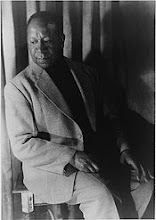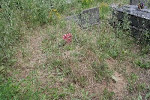I'm not sure what drew me to Sainte-Anne's Hospital last Wednesday, but it was powerful.
I was feeling exhausted and debating taking a well-deserved nap when I looked outside and saw blue sky in the direction of the hospital.
Counterintuitively, something told me that I needed exercise more than I needed to sleep.
So, I set out with the intent to enjoy a tour of the grounds where Beauford strolled during his four-year stay at the hospital.
The hospital continues to renovate buildings and improve its landscape. Just past the reception area, an administrative building and the courtyard in front of it look fresh and new. A huge mural celebrates the 100th anniversary of the Fédération Hospitalière de France (FHF - French Hospital Federation), of which Sainte-Anne's is a member.
Administrative building and courtyard
© Entrée to Black Paris
When I visit the hospital, I usually walk straight down Allée Paul Verlaine to Parc Charles Baudelaire. I immediately noticed that this tree-lined thoroughfare had been the subject of recent landscaping - short wooden fences protected new plantings of wood spurge at the base of the trees.
Allée Paul Verlaine
© Entrée to Black Paris
Wood spurge
© Entrée to Black Paris
Something told me to turn off the road and go in a different direction that day. I found myself walking past the Musée d'Art et d'Histoire into the area that borders the rear of the psychiatric nursing facility of the Préfecture de Police.
I was rewarded with the discovery of a medieval garden and a small vineyard!
There is no path to the garden. You must walk across a long stretch of grass to enter the enclosed area.
Medieval garden - sign
© Entrée to Black Paris
Medievel garden
© Entrée to Black Paris The garden is quite small, but idyllic nonetheless. I was greeted by the gentle fragrance of lavender as I entered this space to take a few photos.
When I retraced my steps to the medieval garden sign and walked straight past it, I was startled to see the vineyard. It is planted around a sculpture of Victor Hugo by Georges Bareau.
Grape vines surrounding Victor Hugo
© Entrée to Black Paris
The last time I photographed the sculpture was in 2018. Nothing remotely resembling a garden of any kind, let alone a vineyard, was there at that time.
Victor Hugo
Georges Bareau
Enameled stoneware
Given to the City of Paris in 1911
Installed at Sainte-Anne's Hospital in 1952
Photo © 2018 Entrée to Black Paris
Since then, the hospital has installed a white slab on which the sculpture now sits. They have placed a table and chairs there so hospital personnel and visitors can enjoy the view.
Grape vines surrounding Victor Hugo
© Entrée to Black Paris
Near the sculpture, more mature vines are planted on a slope called Coteau "Les Contemplations." (Les Contemplations is the name of a collection of poems written by Hugo and published in 1856.)
Coteau Les Contemplations
© Entrée to Black Paris
A couple of olive trees punctuate this area as well.
Olive tree (left), grape vines, and mimosa tree (right)
© Entrée to Black Paris
The grapes on the vines in this area are maturing nicely.
Grape vines and mimosa tree
© Entrée to Black Paris
Wine grapes
© Entrée to Black Paris
To date, I have found no information on when the vineyard was planted or what the hospital does with the harvest!
I followed Allée Vincent Van Gogh away from the Coteau. Near its intersection with Allée Paul Verlaine, I discovered a plaque attesting to the bombardment of the hospital during World War I.
World War I plaque
© Entrée to Black Paris
It reads "A German artillery shell fell on this wall on May 27, 1918 at 6:30 AM."
Once back on Allée Paul Verlaine, I walked past Parc Charles Baudelaire and found that the shallow trenches that once served as a man made rivulet had been filled with flower beds.
Lion sculpture at Parc Charles Baudelaire in 2019
© Entrée to Black Paris
Lion sculpture at Parc Charles Baudelaire in 2024
© Entrée to Black Paris
Parc Charles Baudelaire in 2024
© Entrée to Black Paris
Continuing down Allée Paul Verlaine, I noted that the façade of the central administration building has been freshly scrubbed.
Central administration building
© Entrée to Black Paris
Going through this building's passageway toward the pharmacy, I turned my gaze toward my favorite sculpture on the grounds - Daphne.
Daphne
© Entrée to Black Paris
The flowers surrounding the pedestal were graffiti geraniums and biennial beeblossoms.
Pink and red graffiti geraniums
© Entrée to Black Paris
Biennial beeblossoms
© Entrée to Black Paris
Because I spent so much time in the area of the medieval garden and the vineyard, I had to move quickly through the rest of my visit to get back to my office for a meeting. Happily, I was still able to take several photos of the flora as I made my rounds before leaving the campus.
Lily of the Nile
© Entrée to Black Paris
Dahlia
© Entrée to Black Paris
Purple lilies
© Entrée to Black Paris
Balfour's Touch-me-not
© Entrée to Black Paris
Gladiola
© Entrée to Black Paris
Plains coreopsis
© Entrée to Black Paris
Perhaps my next blog post about Sainte-Anne's Hospital will be about a mid-winter visit. Then I will have written about all four seasons there.
To read about early spring and fall visits to the hospital, click on the links below:
Early Spring at Sainte-Anne's Hospital
Fall Flowers at Sainte-Anne's Hospital









































